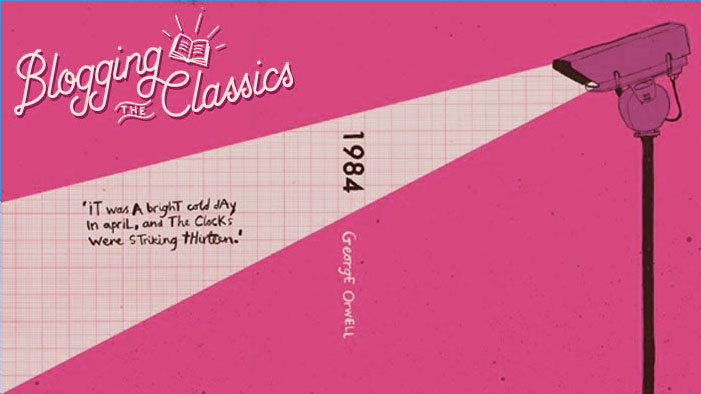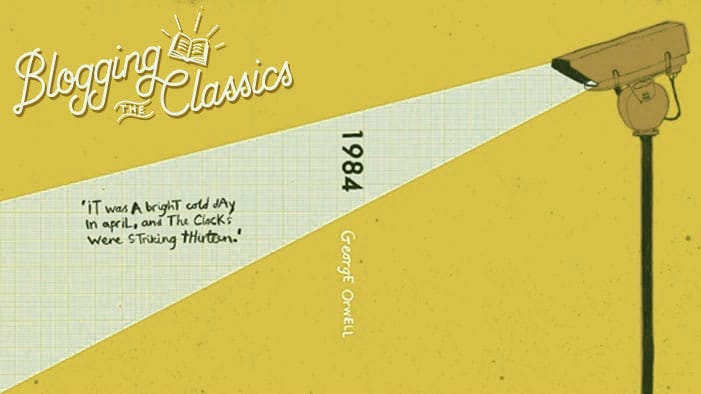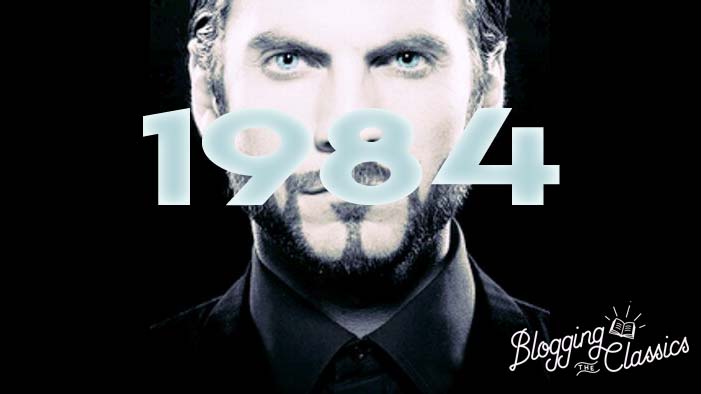Blogging 1984: III (Part I, Chapters 4 & 5)

This week, we find out what Winston does all day at work—the greatest pleasure in his life, if not an activity so tedious he can’t be bothered to disguise his loathing from the telescreens. Know the feeling? Let’s hop right in.
At the ministry, Winston sits in a cubicle, and receives little paper messages coded in Newspeakâ„¢: chiefly, his job is to go back and “rectify” old newspapers with new facts. As an example, “times 14.2.84 miniplenty misquoted chocolate rectify” translates roughly to “go back and change the record so the Ministry of Plenty *doesn’t* promise not to reduce chocolate rations *headdesk headdesk*.” If Big Brother has been wrong about the movements of foreign armies, Winston rewrites the predictions after the fact, and that edition of the paper is reissued so that Big Brother has been correct all along.
Day by day and almost minute by minute, the past was brought up to date.
All day, it’s a soulless ballet of Newspeak messages popping out one hole in the wall; newspapers to be altered flying out another; changes submitted back into the void, and all evidence of the act of revision sent down a tube into a furnace—a sort of grueling line of work akin to being hired as an intern for the Huffington Post. Still, Winston takes a bit of pride in his creativity. When the production figures for boots come in well below the prediction, Winston doesn’t just adjust the original quota to meet the actual count; he revises it down so that the mighty Oceania has actually exceeded its target.
In any case, sixty-two millions was no nearer the truth than fifty-seven millions, or than a hundred and forty-five millions. Very likely no boots had been produced at all. Likelier still, nobody knew how many had been produced, much less cared. All one knew was that every quarter astronomical numbers of boots were produced on paper, while perhaps half the population of Oceania went barefoot.
Is there possibly anything more British than hearing something profoundly ridiculous and responding, “Well, what business is it of mine how many boots we produced anyway, I’ve got levers to pull, init.” Just a total resignation to absurdity.
Next door to Winston’s cube, Tillotson beavers away; on the other side of Winston, a sandy-haired woman tends to removing traces of the “vaporized” (people who had become “unpersons”) from records—note, “There was a certain fitness in this, since her husband had been vaporized a couple of years earlier.” Nearby, an “ineffectual, dreamy creature” named Ampleforth puts his talents of rhyme and metre to rewriting classic poetry so that all the subversive themes have been removed, and can I just say that British names are my favorite in all the world (Ampleforth! Tillotson!).
The Ministry of Truth is basically one big corrections factory.
Separate departments issue hand-photoshopped materials, edited videos, and materials specially for consumption by the proles: “rubbishy newspapers containing almost nothing except sport, crime and astrology, sensational five-cent novelettes, films oozing with sex, and sentimental songs.” Here, George has just described the contents of my bookshelves and iTunes library—mostly just old copies of US Weekly, Sweet Valley High novelettes and Ed Sheeran singles.
Presently, Winston receives a difficult assignment: to submit an “edit” of the past that keeps Big Brother from issuing an Order of Conspicuous Merit to a gent, Comrade Withers, who has subsequently been disgraced and is now an “unperson.”
And here’s a good sentence as Winston tries to invent a way out for Big Brother:
Winston stroked his nose with a paperclip.
He ponders replacing the old news with a separate and unrelated piece of news, and hits on a winner: “Today, he should commemorate Comrade Ogilvy. It was true that there was no Comrade Ogilvy, but a few lines of print and a couple of faked photographs would soon bring him into existence.”
*Mischief middle-managed.*
After an exerting morning of work, lunch in minitrue is about as exciting as a date at Chipotle. Winston lines up in the cafeteria, and is joined in the queue by his comrade, a generally unbearable acquaintance named Syme. The short, pitiable Syme works as a professional pedant for the Newspeak department. They have the kind of stilted conversation that you might have waiting in line to have your student ID photo taken:
Syme: Hey Wins, man, you catch Game of Thrones yesterday? Wait, did I say Game of Thrones? I meant the public hanging of spies.
Winston: *looks at the roof* Nahhhh, I’ll have to Netflix it.
Syme and Winston pre-game for their lunch of pink stew, bread, a cube of cheese, crappy (Victoryâ„¢) coffee, and a tablet with a mug of Victory Ginâ„¢, which helps the filth go down. Winston then pre-emptively asks Syme about his work on the Eleventh Newspeak Dictionary, as it is the only topic on which Syme is not completely insufferable—you’ve played this game, every time you’ve headed off a discussion about the Superbowl by asking your sports-mad friend for their thoughts on Liam and Miley.
Syme launches into an animated seminar on his daily work bringing about the destruction of words for Big Brother. (“It’s a beautiful thing.”) Why, if you have the word “good,” he explains, would you need a separate word for bad? Instead, just use “ungood” or “doubleungood.” In the end, Syme tells us, when you whittle language down further and further, until you arrive at just one or two words, the very *concept* of good and bad is removed altogether, and humans cease to think at all.
This is an interesting theory to ponder:
- The idea that a shrinking lexicon correlates with rising stupidity flies in the face of what we know to be true: the stupider we get, the more likely we are to invent new, more rubbish words like Snowmaggedon, Bennifer, and croissanwich.
- I have briefly considered a world in which “barmy,” “gormless,” “dotty,” and “crumpet” don’t exist, and I do not care to live in it.
- Barthes, Derrida, and Foucault would all disagree with Syme—rule one of semiotics is that words are signifiers; shadows of the thing, rather than the thing itself. Rule two of semiotics is that thought > speech > text. Rule three is the notion of Truth is utterly flawed. Rule four of semiotics is do not speak about semiotics [outside of class]. Just because it’s incredibly boring for others to hear about.
Syme is a verified know-it-all, and proceeds to spell out Big Brother’s entire secret plan in the environs of the cafeteria:
“In the end we will make thought crime literally impossible, because there will be no words in which to express it.”
Syme has l i t e r a l l y zero chill. Winston realizes that his poor comrade is a goner:
He is too intelligent. He sees too clearly and speaks too plainly. The Party does not like such people.
As Winston glances around the cafeteria, he takes in the meaningless anti-Goldstein, pro-Big Brother quacking of men and women, “pure orthodoxy, pure Ingsoc.” For poor old Winston, “life is [literally] a tale told by an idiot, full of sound and fury, signifying nothing.”
There are, obviously, important political lessons to be taken from 1984, but do not overlook George Orwell’s deep, abiding hatred of idiots. This is a major theme. Winston suddenly feels sorry for Syme: He lacked “discretion, aloofness, a sort of saving stupidity” as graces the rest of the lobotomized population.
And along comes Parsons, man of the jockstrap himself. “Beads of moisture stood out on his pink face.” Are you picturing Uncle Vernon? Me too. Vernon prattles on about the fundraiser he is leading for Hate Week, and then boasts about a man his daughter recently tracked and turned over to the Thought Police for being a spy. Apparently, she noticed his shoes were non-standard issue and dobbed him in. THESE KIDS. Their chat is interrupted by the triumphant announcement over the P.A. that production figures have exceeded their quotas(!). Parsons “sat listening with a sort of gaping solemnity, a sort of edified boredom.”
Orwell hates numpties. H8s them.
As the confabulist announcements continue, Winston thinks about the type of beetlish servile men who flourish in this sad, idiotic future, and of all the people he can imagine being vaporized before long: Mrs. Parsons, O’Brien, himself. The only people likely to withstand attempts to brainwash the population through the decimation of language, in fact, are the proles, those cockney hicks who occupy the lower rungs of society and would need years of elocution lessons before they could speak in anything approaching Newspeak. More, I am SURE, on them later.
Winston becomes aware that Dystopian Rey is sitting nearby, staring at him; naturally, this is very unnerving. What secret thoughts might he have given away through some unwitting Facecrimeâ„¢? (Hopefully not the vision he had earlier of her romping naked through the fields.)
Notes:
- Would you be vaporized? If you have ever:
a) made fun of Coldplay,
b) rolled your eyes at a teacher,
c) sighed, “*everyone* is idiots,” or
d) felt marooned by your own intelligence,
the answer is: yes.
2. Do you actually believe that killing off language is an effective way to kill thought? My counter argument is the part in Friends where Joey is able to make “Grandma’s chicken salad” sound dirty. Whatever language you give us, someone will find a way to subvert it.
3. You won’t BELIEVE what we find out in the next chapter.
George Orwell 1984 predictions accuracy check-in…
How he thought 1984 would look: bleak, grey, soulless
How 1984 actually looked: absolutely bananas, as Cyndi Lauper shows us…
Read the next installment of Blogging 1984.
Find the next installment along with the rest of Janet’s 1984 blog here, and find our Blogging the Classics index page here.















